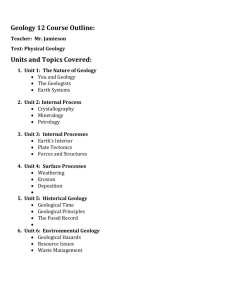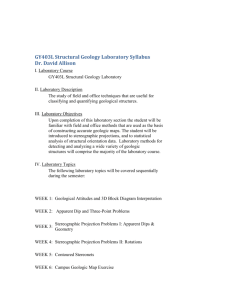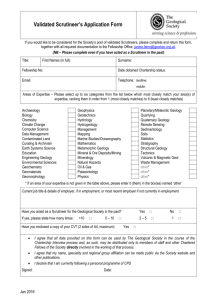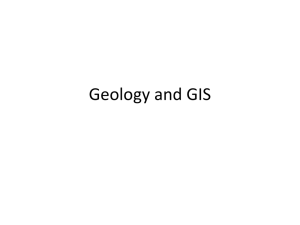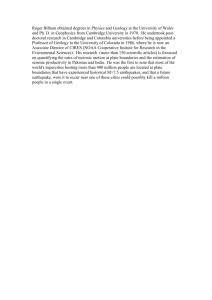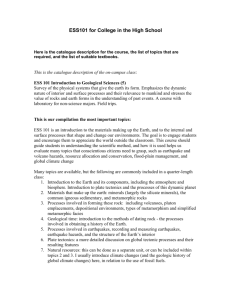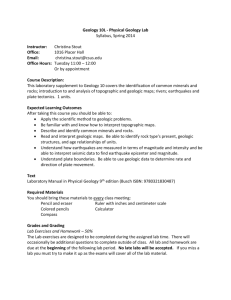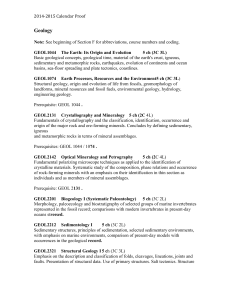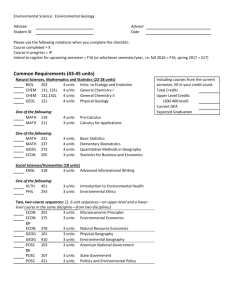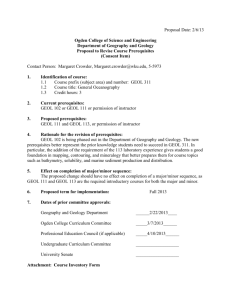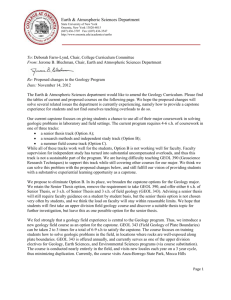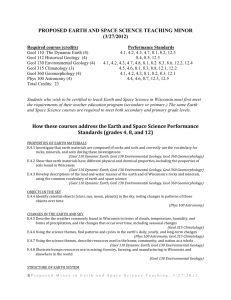Geology for Engineers Syllabus
advertisement
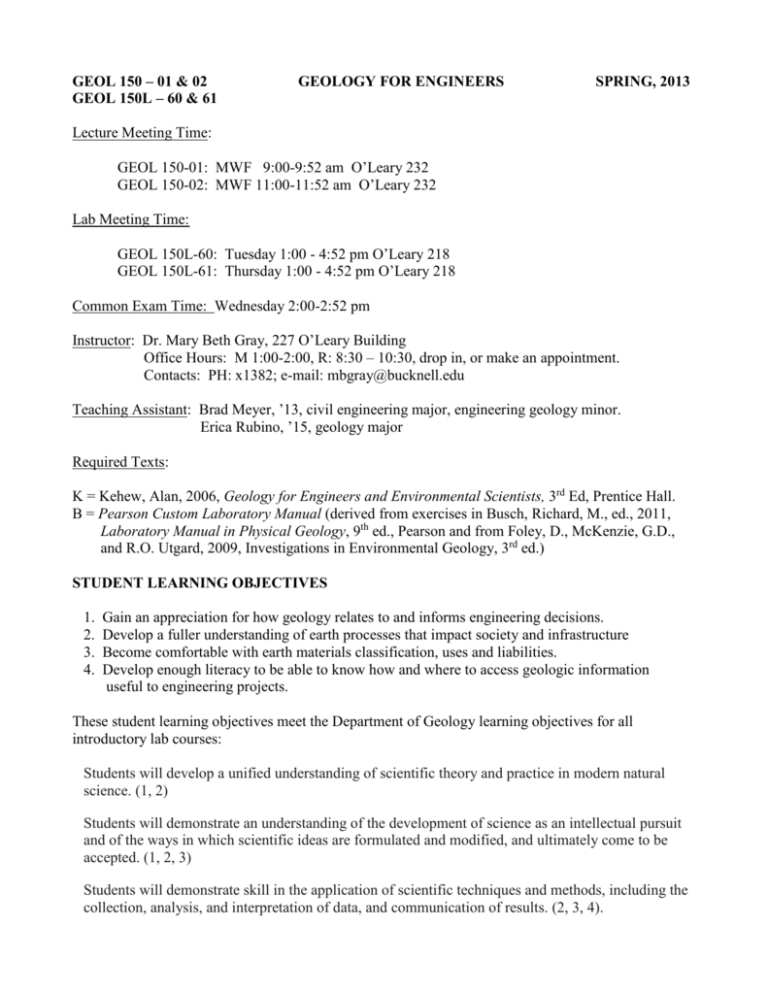
GEOL 150 – 01 & 02 GEOL 150L – 60 & 61 GEOLOGY FOR ENGINEERS SPRING, 2013 Lecture Meeting Time: GEOL 150-01: MWF 9:00-9:52 am O’Leary 232 GEOL 150-02: MWF 11:00-11:52 am O’Leary 232 Lab Meeting Time: GEOL 150L-60: Tuesday 1:00 - 4:52 pm O’Leary 218 GEOL 150L-61: Thursday 1:00 - 4:52 pm O’Leary 218 Common Exam Time: Wednesday 2:00-2:52 pm Instructor: Dr. Mary Beth Gray, 227 O’Leary Building Office Hours: M 1:00-2:00, R: 8:30 – 10:30, drop in, or make an appointment. Contacts: PH: x1382; e-mail: mbgray@bucknell.edu Teaching Assistant: Brad Meyer, ’13, civil engineering major, engineering geology minor. Erica Rubino, ’15, geology major Required Texts: K = Kehew, Alan, 2006, Geology for Engineers and Environmental Scientists, 3rd Ed, Prentice Hall. B = Pearson Custom Laboratory Manual (derived from exercises in Busch, Richard, M., ed., 2011, Laboratory Manual in Physical Geology, 9th ed., Pearson and from Foley, D., McKenzie, G.D., and R.O. Utgard, 2009, Investigations in Environmental Geology, 3rd ed.) STUDENT LEARNING OBJECTIVES 1. 2. 3. 4. Gain an appreciation for how geology relates to and informs engineering decisions. Develop a fuller understanding of earth processes that impact society and infrastructure Become comfortable with earth materials classification, uses and liabilities. Develop enough literacy to be able to know how and where to access geologic information useful to engineering projects. These student learning objectives meet the Department of Geology learning objectives for all introductory lab courses: Students will develop a unified understanding of scientific theory and practice in modern natural science. (1, 2) Students will demonstrate an understanding of the development of science as an intellectual pursuit and of the ways in which scientific ideas are formulated and modified, and ultimately come to be accepted. (1, 2, 3) Students will demonstrate skill in the application of scientific techniques and methods, including the collection, analysis, and interpretation of data, and communication of results. (2, 3, 4). DESCRIPTION: This course is designed to introduce engineering students to geologic materials and phenomena that impact engineering and land use decisions. Concepts introduced in lecture will be reinforced by lab and homework exercises. These exercises will also help to develop analytical and observational skills used in engineering geology. As a course for beginning engineering students, it is intended to provide a geological context for later engineering courses, such as geotechnical engineering, environmental engineering, hazardous waste and water resource management, which require familiarity with geologic materials and processes. This course also serves as a prerequisite for several upper level geology courses that are particularly useful for engineers (e.g., structural geology, geomorphology, geophysics and hydrogeology). LABORATORY EXERCISES: All indoor labs will involve exercises that can be completed within a three-hour lab period (1:00 - 4:00). Indoor labs will rely on the laboratory manual and other materials (models, experiments, samples, etc.). Labs will be completed in pencil. Please bring your laboratory manual, calculator, centimeter ruler, mechanical pencil and protractor to every indoor lab. Outdoor labs will be four hours long (1:00 - 5:00) due to travel time requirements. These labs will be valuable 'hands on' learning experiences focusing on the field practices of engineering geology. Be sure to wear appropriate clothing (rain gear may be necessary) and boots for outdoor trips. Lab exercises will be completed and turned in during the lab period unless otherwise announced. ASSIGNMENTS: Reading and homework assignments are designed to enhance your understanding of the class material. Deadlines for homework will be announced in class. Late homework assignments (and any other assignments with due dates) will be penalized 10% for each day late. You are expected to follow the format protocol used in the Engineering College for homework assignments. For example, assignments must be done in pencil, line drawings should be constructed using a straight edge and answers must be boxed. If you have questions about this, please ask. COLLABORATION: Students may collaborate on homework and lab exercises unless otherwise notified. Each student must turn in his or her own assignment/lab however. All exams, quizzes and the comprehensive final are to be completed strictly by the individual with no collaboration permitted. Refer to your student handbook for information on academic responsibility. QUIZZES: Quizzes will be five or ten-minute appraisals of your understanding of a topic recently addressed in the reading and/or class period. The quizzes help me understand how well the class is learning critical concepts. Another function of the quizzes is to give added motivation to stay up to date in course readings and other coursework between exams. At the end of the semester I will drop your lowest quiz grade and calculate your quiz average from your five remaining quiz scores. LIBRARY RESEARCH PROJECT: Students will select a case study or topic that integrates geology and civil engineering. Students will present the results of their library research as a poster presentation during the last lab of the semester. More details of this assignment will be given a few weeks into the semester. ABSENCES: The attendance/absence policy conforms to that of the University. Students must alert Dr. Gray to scheduled absences in the course due to sports or other activities during the first week of class. This will allow time to make special arrangements for making up the work and/or rearranging the course schedule if necessary or possible. Class attendance is strongly encouraged and will be a factor in the final grade for the course. PARTICIPATION: Students are expected to be 100% vested in learning engineering geology during class hours. Active participation and a professional approach to class are expected. The extent and nature of student participation will be evaluated and incorporated into the final grade. EXAMS: Each exam will cover all material to date in lab, homework assignments, classroom, and readings. They will be cumulative with emphasis on material covered since the previous exam. I write new exams each time I teach the course. All of my old exams can be found on our course Moodle site. These exams are meant to serve as examples of my testing style, and practice problems/questions. They are not to be used as indicators of the subjects on which you will be tested (the course content and organization varies significantly from year to year). EXTRA CREDIT: Students may improve their course grade by participating in related field trips and attending guest lectures as they may occur during the semester. To receive credit, students must submit a one page written essay to be turned in no later than one week after the event. This summary is to be written by the individual and is not permitted to be collaborative. The essay will consist of a half page summary of the content of the event and a half page personal response to the event. Extra credit eligible events will be announced throughout the semester. The professor makes no commitment to provide extra credit opportunities. Each successfully completed extra credit assignment will be worth 1% of the total course grade and will replace percentage points otherwise dedicated to the hourly exam portion of the grade. No student may receive more than 3% extra credit. GRADING: THREE EXAMS, ONE FINAL FIVE QUIZZES LABS and HOMEWORK POSTER PRESENTATION ATTENDANCE/PARTICIPATION 35% 15% 40% 7% 3% University Required Reminders Bucknell University Honor Code As a student and citizen of the Bucknell University community: 1. I will not lie, cheat, or steal in my academic endeavors. 2. I will forthrightly oppose each and every instance of academic dishonesty. 3. I will let my conscience guide my decision to communicate directly with any person or persons I believe to have been dishonest in academic work. 4. I will let my conscience guide my decision on reporting breaches of academic integrity to the appropriate faculty or deans. Bucknell University expectations for academic engagement Courses at Bucknell that receive one unit of academic credit have a minimum expectation of 12 hours per week of student academic engagement. Student academic engagement includes both the hours of direct faculty instruction (or its equivalent) and the hours spent on out of class student work. Half and quarter unit courses at Bucknell should have proportionate expectations for student engagement.
